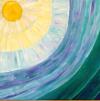While watching this short film, there is a feeling that not very much of interest is really going on, and that it is being shown to us in a not very interesting or successful way. But upon reflection, it seems to pile up one layer of implication after another, in a rather precise way, ultimately seeming quite rich in significance, which is to say, quite surprisingly fertile for thought.
A man wants desperately to elude the seeing eye, but, behind all of his attempts to eliminate it, he cannot avoid knowing that what sees him follows along behind him (behind the back of his consciousness) wherever he goes, as a kind of phantom cameraman. The second question raised by Beckett’s film is why the one seen keeps checking his pulse: is it that he fears his looming mortality, or on the contrary that he desires it, or is it that he is preparing for his end by progressively removing himself from the visible world, from visibility by the world? We might also well think that this doubled self arises from the technological eye (the “proto-cinematic” eye, or, beyond that, the “archi-cinematic” eye, as Bernard Stiegler would put it), which opens a chasm in oneself that in turn opens a viewpoint on oneself, and is thus the condition of possibility of self-knowledge, while at the same time being its condition of impossibility, given that this chasm amounts to the introduction of a split between the self that sees and the self that is seen – the introduction, in other words, of a multiplicity and a diversity into the “one” of “oneself”.
Finally, this proto-cinematic or archi-cinematic eye does not just see, it records, leaving, for example, photographs of the past. As an exteriorized memory, it makes it possible for me to have knowledge of my past, both the past I have lived and can thus see again in these recordings, and the past that came before me, which I can thus see and know for the first time via such mnemotechnical artifacts. The consequence of this introduction of a technologically recorded past is that, in this way, the future, too, opens, which is to say that this proto-cinema is also the condition of possibility and impossibility of the knowledge I have of my own mortality – which I know in the mode of not knowing it, and with the consequence that I am constantly tempted to flee from this viewpoint I have of the horizon of my existence, because this horizon shows me both the destination to which I am inexorably headed and the fact that I cannot know this destination before I arrive there, which will be, in fact, the unarrival of my existence.

